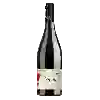
Winery Herve BordeChez Basile Cuvée Morgane Saint-Joseph
This wine generally goes well with poultry, beef or game (deer, venison).
Food and wine pairings with Chez Basile Cuvée Morgane Saint-Joseph
Pairings that work perfectly with Chez Basile Cuvée Morgane Saint-Joseph
Original food and wine pairings with Chez Basile Cuvée Morgane Saint-Joseph
The Chez Basile Cuvée Morgane Saint-Joseph of Winery Herve Borde matches generally quite well with dishes of beef, lamb or game (deer, venison) such as recipes of tournedos rossini, roast lamb with thyme or watercress salad with vitamins.
Details and technical informations about Winery Herve Borde's Chez Basile Cuvée Morgane Saint-Joseph.
Discover the grape variety: Tressailler
According to published genetic analyses, it is the result of a cross between Pinot Blanc and Gouais Blanc, which is registered in the Official Catalogue of Wine Grape Varieties, list A1.
Informations about the Winery Herve Borde
The Winery Herve Borde is one of of the world's greatest estates. It offers 3 wines for sale in the of Rhône septentrional to come and discover on site or to buy online.
The wine region of Rhône septentrional
Côtes du Rhône is a regional appellation in the Rhône Valley in eastern France. It applies to red, rosé and white wines, and includes more than 170 villages. The area follows the course of the Rhône southward for 125 miles (200 km) from Saint-Cyr-sur-le-Rhône to Avignon. A small portion of the wines in the appellation are white wines.
The wine region of Rhone Valley
The Rhone Valley is a key wine-producing region in Southeastern France. It follows the North-south course of the Rhône for nearly 240 km, from Lyon to the Rhône delta (Bouches-du-Rhône), near the Mediterranean coast. The Length of the valley means that Rhône wines are the product of a wide variety of soil types and mesoclimates. The viticultural areas of the region cover such a distance that there is a widely accepted division between its northern and southern parts.
The word of the wine: Sulphating
Treatment, formerly practiced with copper sulfate, applied to the vine to prevent cryptogamic diseases.











